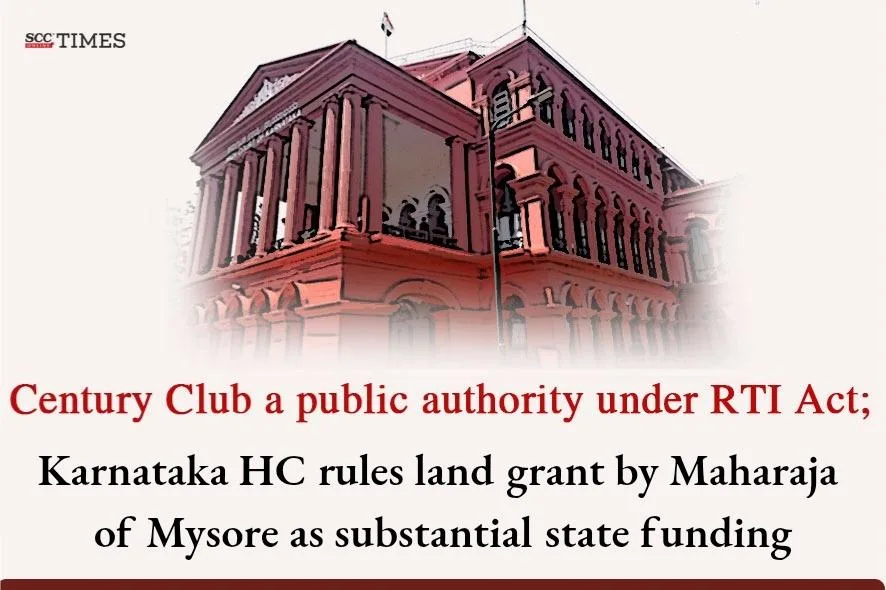Karnataka High Court: In writ petition filed by the Century Club (‘Club’) challenging the order dated 14-03-2018 passed by the Karnataka Information Commission, which directed the club to furnish information seeking a certified copy of the list of records maintained by the Club, under the Right to Information Act, 2005 (‘RTI Act’), a Single-Judge Bench of Suraj Govindaraj, J., dismissed the petition holding that the grant of 7.5 acres of land by the then Maharaja of Mysore in 1913 constituted a substantial contribution of financing by the State, making the Club a public authority subject to the provisions of the RTI Act.
Background
The Club, a society registered under the Karnataka Societies Registration Act, 1960, was founded by the Maharaja of Mysore Narasimha Raja Wodeyar and M. Visveswaraya. In 1913, the Maharaja of Mysore granted 7.5 acres of land to the club for its activities, which subsequently vested in the Club and has been used for its purposes ever since. Respondent No.1 applied under Section 6(1) of the RTI Act, seeking a certified copy of the list of records maintained by the Club as required to be maintained and certified under Section 4(1)(a) and (b) of the Act, respectively. The Club, by letter dated 19-11-2012, informed Respondent No.1 that it was not a public authority as defined under Section 2(h) of the RTI Act and therefore not required to furnish the information.
Following this denial, Respondent No.1 filed a complaint with the Karnataka Information Commission under Section 18(1) of the RTI Act on 26-06-2013. The complaint alleged that the free grant of 7.5 acres of land by the Maharaja of Mysore amounted to substantial indirect finance by the State, thereby bringing the Club under the ambit of a public authority as per Section 2(h) of the RTI Act. The Karnataka Information Commission, in its order dated 14-03-2018, rejected the Club’s contentions and directed it to furnish the requested information. Challenging this order, the Club filed the present writ petition.
Issue
Whether the grant of land on which the Club is situated would amount to a substantial contribution of financing by the State, though made by the then Maharaja of Mysore, for making the RTI Act applicable to the Club?
Analysis and Decision
The Court noted that the Maharaja of Mysore was the patron-in-chief of the Club, granted 7.5 acres of land in 1913 for the Club’s activities, and no payment was made by the Club for this land. The Court noted that the land grant was from the Kingdom of Mysore, not the personal property of the Maharaja, indicating it was a grant made on behalf of the government.
The Court observed that the entire Club is situated on this granted land, and its activities, including sports, leisure, and entertainment for its members, are carried out exclusively on these premises. The Court further observed that without this land, the very existence of the Club would fall into doubt because no activities of the Club could be carried out without this land being available to it. The Court noted that even though the day-to-day expenses were met by the contributions made by the members, the fundamental dependence on the granted land remained.
The Court noted the decision in D.A.V. College Trust & Management Society v. Director of Public Instructions, (2019) 9 SCC 185, wherein the Supreme Court had held that “substantial means a large portion, not necessarily more than 50%, and that a grant of land free of cost or at a heavy discount can itself constitute substantial financing, especially if the institution’s very establishment is dependent on such State largesse. Further, the value of the land should be evaluated not only on the date of allotment but also on the date when the question of substantial financing arises.”
Applying this principle, the Court observed that the current valuation of the 7.5 acres of land, situated in the centre of the city, would run into hundreds of crores if not thousands. The contribution made by the members of the Club, as membership fees or any other head of account, pales into insignificance when compared to the value of the land.
In light of the afore-stated reasons, the Court observed that there was a substantial contribution made by the State. i.e., the erstwhile Kingdom of Mysore, through the Maharaja of Mysore, granted 7.5 acres of land to the Club in 1913, thereby making the provisions of the RTI Act applicable. The Court found no infirmity in the order passed by the Karnataka Information Commission.
The Court dismissed the petition, holding that the grant of land on which the Club is situated amounted to a substantial contribution of financing by the State, made by the then Maharaja of Mysore, and that the RTI Act was applicable to the Club.
[Century Club v. S. Umapathy, Writ Petition No. 13336 of 2018, decided on 08-07-2025]
Advocates who appeared in this case :
For the Petitioner: M.S. Rajendra, Advocate
For the Respondent: S. Umapathy, Party-in-Person for C/R1; G.B. Sharath Gowda







